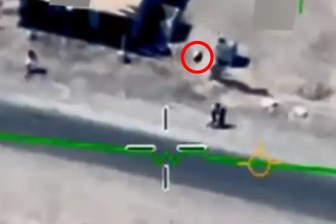As a prolonged spring heat dome continues to hover over Manitoba, many cattle ranchers are taking extra precautions to keep their livestock herds safe.
Warren Graydon runs a cattle ranch in southeastern Manitoba. He says each day is a race against the heat.
“I check my cattle early in the morning. If I’m going to move them paddock to paddock, I do it early in the morning,” Graydon said.
Warren Graydon feeds and checks his cattle earlier in the day, trying to beat the extreme heat.
Josh Arason / Global News
“Do everything in the cool of the day. If I need to process them, do it the cool of the day. If I need to haul, do it in the cool of the day.”
“If I’m hot, they’re hotter.”
Graydon says he has to take extra precautions by double-checking water sources, ensuring the animals have access to shade, and watching for signs of heat stress or dehydration.
“When you’re feeling ill, you’re off, you don’t want to talk to people, you don’t want to see people, you don’t want to be bothered,” he said. “They’re the same way. They just can’t tell you when they’re sick.”
Graydon also says feeding time has to be earlier, as eating increases the cattle’s body temperature even more.
“They’re my livelihood, that’s where my income comes from,” Graydon said.
“They are not pets but sometimes they’re treated as pets, because that’s what makes my money.”

Graydon says overall, he and his cattle can manage the heat, as long as rainfall stays in the forecast and prevents his pastures from drying up.
“As long as we’re getting timely rains and we don’t go into a drought stage, I’m fine with this,” he said.
Melissa Atchison, the research and extension specialist with Manitoba Beef Producers, says the prolonged heat means most ranchers need to put more work in.
“Fortunately, heat stress fatality is quite low in our livestock but we still do take precautions. Obviously, it’s very hot out there,” Atchison said.
“This is not a 9 to 5 job, ranching, so we take the heat into consideration. If we have to move our animals or anything like that, we’re going to do it very early in the morning or later in the evening.”
Claus Leppelman, a livestock veterinarian with the Beausejour Animal Hospital, says this heat brings a heightened risk for livestock.
“Just that prolonged heat and the possibility of heat stroke, and especially when we’re dealing with younger calves, the potential (for) dehydration as well,” Leppelman said.
He says, fortunately, he hasn’t had to deal with any calls related to heat exhaustion this spring. He says while many producers are well-equipped to deal with extreme heat like this – noting some dairy farmers have fans and sprinkler systems in their barns – heat stress can have broader impacts on cattle.
“When it gets really hot like this, cows don’t really want to eat. Just like us, I guess,” he said. “Typically you’ll see there is a reduction in feed intake if cows get hot, and then that results in less milk being produced.”

© 2023 Global News, a division of Corus Entertainment Inc.








More Stories
Fair share: the right office solution can take finding the right partner
Ontario faces crew shortages, aircraft issues in fight against wildfires | Globalnews.ca
Refugee attends open house at Downtown Eastside affordable housing facility – BC | Globalnews.ca